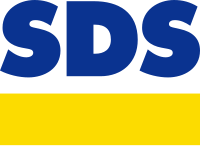Slovenian Democratic Party
|
Slovenian Democratic Party
|
|
|---|---|
 |
|
| Leader | Janez Janša |
| Founded | 16 February 1989 |
| Headquarters | Ljubljana |
| Membership (2013) | 30,000 |
| Ideology |
Liberal conservatism National conservatism |
| Political position |
Historical: Right-wing Present: Centre-right |
| European affiliation | European People's Party |
| International affiliation |
Centrist Democrat International, International Democrat Union |
| European Parliament group | European People's Party |
| Colours | Yellow and blue |
| National Assembly |
21 / 90
|
| European Parliament |
3 / 8
|
| Website | |
| http://www.sds.si | |
The Slovenian Democratic Party (Slovene: Slovenska demokratska stranka, SDS) is liberal-conservativepolitical party in Slovenia. In 2003, it changed its name from the Social Democratic Party of Slovenia (Socialdemokratska stranka Slovenije). Led by Janez Janša, the SDS is a member of the European People's Party (EPP), Centrist Democrat International and International Democrat Union.
The Slovenian Democratic Party has developed from the merger of two distinct political parties, being the legal successor of both of the Social Democratic Union of Slovenia and the Slovenian Democratic Union, two of the most influential parties of the Democratic Opposition of Slovenia (DEMOS) coalition which defeated the former Communist Party of Slovenia in the first free Slovenian elections on April 1990 and carried out the democratization of Slovenia and its secession from Yugoslavia. The Social Democratic Union of Slovenia had emerged from an independent, anti-Communist trade union movement in the late 1980s. Its first president was the trade union leader France Tomšič, who in December 1987 organized the first successful large-scale workers strike in Communist Slovenia, following the example of Lech Wałęsa's Solidarity movement in Poland. Tomšič however resigned soon after the founding of the party, endorsing the leadership of Jože Pučnik, a former dissident who had been forced to emigrate to Germany in the 1960s. Under Pučnik's leadership, The Social Democratic Union of Slovenia gradually developed into a moderate social-democratic party, which combined the plea for a social market economy with the support of a welfare state based on a German, Austrian and Scandinavian social model.
...
Wikipedia
